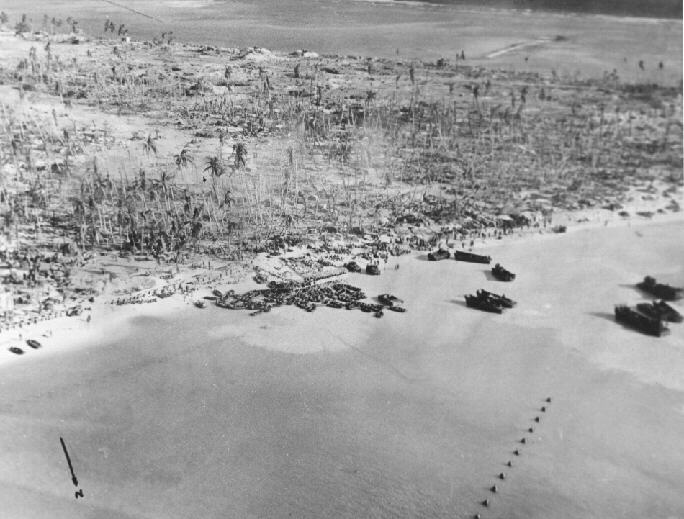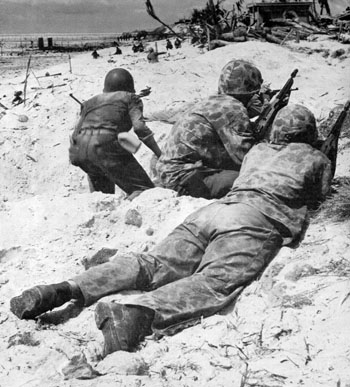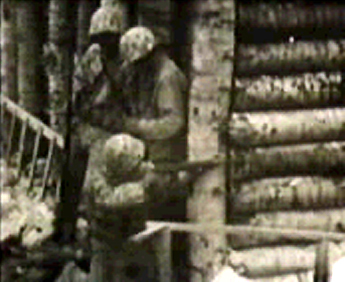COMPANY C, FIRST CORPS MEDIUM TANK BATTALION
DUMMY RUN: NEW CALEDONIA TO NEW ZEALAND AND RETURN
Col. Ed BaleTo tell this story it is necessary to provide background information on Company C. The Company was formed at Camp Pendleton early in 1943 as part of the first, and at that time the only, medium tank battalion in the Corps. I joined it from the Fifty First Composite Defense Battalion, Camp Lejeune, North Carolina in mid May. We trained in the field until mid July when the company embarked in San Diego, along with Company D, in a Liberty Ship. We arrived in New Caledonia in August and occupied a portion of the transient camp pending the arrival of the remainder of the Battalion.
Because of the roads, tanks were parked in a large open area note too far from the docks and remained there throughout our stay in New Caledonia. There was no place to shoot, move and communicate; the meat of training tankers and their organizations. It should be noted that when we landed on Tarawa there had no driver, crew or gunnery training since late June at Camp Pendleton.
Upon the closure of the Battalion into New Caledonia, the Company relocated to a former Raider Battalion campsite some distance from both Noumea and the tanks. Security for the Battalionís tanks required trucking Marines over and hour to change reliefs. Likewise, it was necessary to truck Marines to the area to do the requisite maintenance on the equipment. Training was limited to classroom type, physical conditioning and hikes along the available roads. It was upon returning from one of the hikes, in late September, that I was notified to report to the Battalion Commander.
Upon reporting I was told that the Battalion had been ordered to prepare one Tank Company for movement to join the Second Marine Division for an operation. The only other information available was that the Battalion Commander had called a meeting of the Company Commanders to draw straws to determine which company was to be provided. The Battalion Executive Officer drew the winning straw for me in my absence.
Note: This was one hell of lousy way to make a decision and I never saw it replicated in my entire career.
After a flurry of preparation and then a delay, we embarked on the Moremacport, a cargo ship owned by the Moore-McCormick Lines. Already aboard was part of a Raider Battalion, a group of New Zealanders returning from the Middle East and various cats and dogs. The passage was highlighted by foul weather; including one of the worst storms I have ever experienced. There was a lot of sea sickness aboard; particularly among the troops billeted in below deck troop compartments. The ship stopped in Auckland for a few hours to disembark the New Zealanders and others.
We arrived in Wellington on a beautiful October morning. After mooring and customís clearance, a Marine Major came aboard. Following a visit with the shipís Captain, the Major met with me. I was advised he was to take me to the Division Headquarters in the Windsor Hotel. There I was advised that I was to keep the written orders I received in New Caledonia because we would be returning to New Caledonia to await the arrival of the USS Ashland. It was explained the Ashland was a new type of ship, designed by the British, of which she was the only one operational in the U. S. Navy. I was told there was not enough time for the Ashland to transit to New Zealand, load and arrive at the rehearsal in time. Prior to sailing we would off load two tanks with crews and one officer to join an unnamed infantry battalion which was going to conduct a practice landing. During this landing exercise, tests would be conducted to verily the validity of the fording depth set forth in the Army Field Manual. They would rejoin prior to the operation. I was instructed to return to the ship, that I would be contacted by the Commanding Officer, Second Tank Battalion and to say nothing until the shipís Commander announced the ship would be returning to Noumea. Upon returning to the ship I met with the Captain, discussed the situation and arranged for liberty for my Marines. I told my Executive Officer what I had been told since he was the logical officer to prepare himself and the two tank crews for off loading.
The following morning I was picked up the Operations Officer of the Second Tank Battalion and taken to the camp outside of Wellington. Over lunch with the Commanding Officer and His Executive Officer, I learned that Co. A, Second Tank Battalion was to remain in New Zealand and, at a later, date move to New Caledonia attached to First Corps Medium Tank Battalion. Whether this was a temporary or permanent reassignment was unknown. I was told that I would see the Commanding Officer and others in New Caledonia prior to loading in the Ashland. The two tanks, their crew, with my XO, were off loaded and we sailed for Noumea. Upon arrival we resumed the old routine of school, hikes and tank maintenance.
The CO, XO, and the Operating and Communication Officers flew to Noumea and began preparations for our departure in the Ashland. We stored much of our gear, including all heavy equipment, the tank recovery vehicle, spare parts, all wheeled vehicles and much of our clothing. We were down to bare bones since there would be little resistance where we were headed. I had concluded from the bombing mentioned in STARS AND STRIPES we were headed for Tarawa. The Ashland arrived off Noumea the night of November 3. We loaded and sailed for the rehearsal area, Efate, on November 4.
Three things stick out in my memory of these events.
- The only records of this trip are in the Muster Roll of the company and the Muster Roll of the battalion. The original orders were never endorsed by the Second Marine Division or by the First Corps Medium Tank Battalion. I have the original document in my possession.
- This tank company entered combat at Betio, Tarawa without any tank training or firing any of its weapons since leaving Camp Pendleton in early July.
- There were no deep water fording kits for M4 medium tanks available in the Pacific at time, despite the known necessity to ford at Betio.




Send an Email:
copyright 2010 T.O.T.W.
Created 24 November 2010
